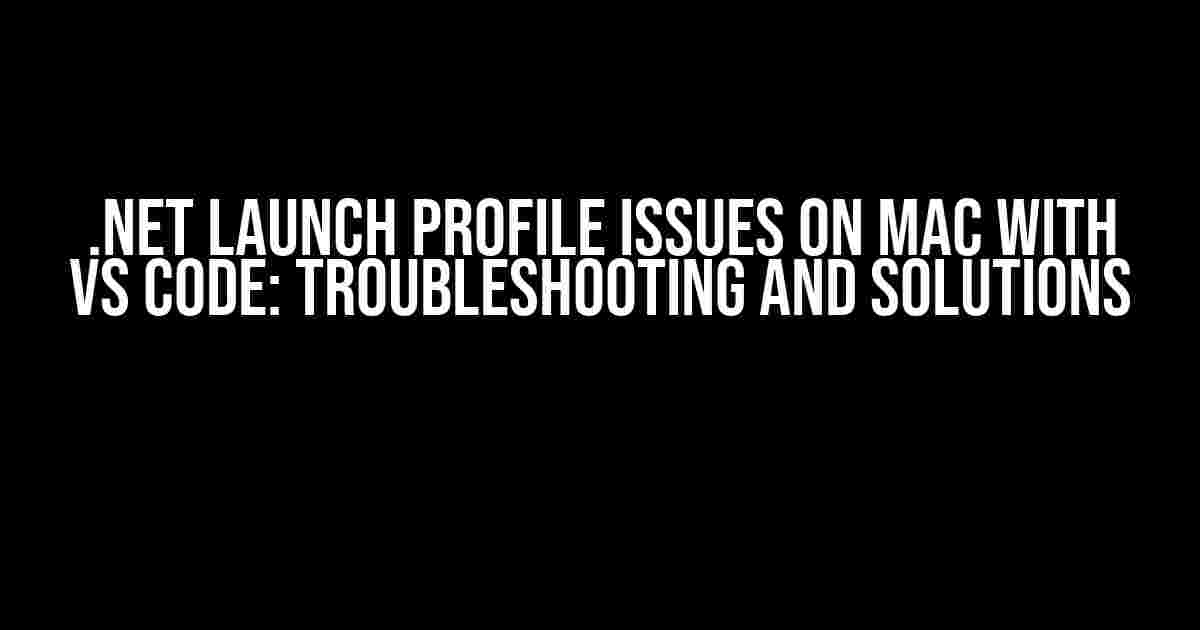Are you tired of encountering .NET launch profile issues on your Mac while using VS Code? Do you find yourself stuck in a never-ending loop of errors and frustration? Fear not, dear developer! This article is here to guide you through the troubleshooting process and provide you with clear solutions to get you back on track.
Understanding .NET Launch Profiles
In VS Code, .NET launch profiles are used to configure how your application is launched and debugged. A launch profile is essentially a collection of settings that specify how to start your application, including the executable, arguments, and environment variables. These profiles are stored in the launch.json file in your project directory.
Why Do .NET Launch Profile Issues Occur on Mac with VS Code?
There are several reasons why .NET launch profile issues occur on Mac with VS Code. Some common causes include:
- Incompatible .NET Core SDK versions
- Incorrect environment variable settings
- Missing or corrupt launch profiles
- Incompatible Visual Studio Code extensions
- permissions issues with the project directory
Troubleshooting .NET Launch Profile Issues on Mac with VS Code
Before we dive into the solutions, let’s go through some troubleshooting steps to help you identify the root cause of the issue:
- Check the VS Code terminal output for error messages
- Verify that the .NET Core SDK is installed and up-to-date
- Review the
launch.jsonfile for errors or inconsistencies - Try deleting the
launch.jsonfile and letting VS Code regenerate it - Check the project directory permissions and ensure that the user has read and write access
Solutions to .NET Launch Profile Issues on Mac with VS Code
Now that we’ve gone through the troubleshooting steps, let’s explore some solutions to common .NET launch profile issues on Mac with VS Code:
Solution 1: Update the .NET Core SDK
If you’re using an outdated .NET Core SDK, it may cause compatibility issues with VS Code. To update the .NET Core SDK, follow these steps:
dotnet tool update -g dotnet
This command will update the .NET Core SDK to the latest version.
Solution 2: Configure Environment Variables
Environment variables play a crucial role in configuring how your application is launched and debugged. To configure environment variables, follow these steps:
In the launch.json file, add the following code:
"env": {
"ASPNETCORE_ENVIRONMENT": "Development"
},
This code sets the ASPNETCORE_ENVIRONMENT environment variable to Development, which is necessary for debugging your application.
Solution 3: Create a New Launch Profile
If your launch.json file is corrupt or missing, you can create a new launch profile by following these steps:
In VS Code, open the Command Palette by pressing Cmd + Shift + P (Windows/Linux: Ctrl + Shift + P). Type “Debug: Open launch.json” and select the command.
In the launch.json file, add the following code:
{
"version": "0.2.0",
"configurations": [
{
"name": ".NET Core Launch",
"type": "coreclr",
"request": "launch",
"preLaunchTask": "build",
"program": "${workspaceFolder}/YourProject.csproj",
"args": [],
"cwd": "${workspaceFolder}/",
"console": "integratedTerminal",
"stopAtEntry": true
}
]
}
This code creates a new launch profile for your .NET Core application.
Solution 4: Disable Incompatible Extensions
Sometimes, incompatible VS Code extensions can cause .NET launch profile issues. To disable extensions, follow these steps:
In VS Code, open the Extensions panel by clicking on the Extensions icon in the left sidebar or pressing Cmd + Shift + X (Windows/Linux: Ctrl + Shift + X).
Disable any extensions that you suspect may be causing the issue.
Solution 5: Check Project Directory Permissions
Permissions issues with the project directory can cause .NET launch profile issues. To check project directory permissions, follow these steps:
Open the Terminal in VS Code by pressing Cmd + Shift + ` (Windows/Linux: Ctrl + Shift + `).
Run the following command to check the permissions of the project directory:
ls -ld ${workspaceFolder}
If the user doesn’t have read and write access, you can change the permissions by running the following command:
chmod -R 755 ${workspaceFolder}
Conclusion
.NET launch profile issues on Mac with VS Code can be frustrating, but by following the troubleshooting steps and solutions outlined in this article, you should be able to resolve the issues and get back to developing your application.
Remember to keep your .NET Core SDK up-to-date, configure environment variables correctly, create a new launch profile if necessary, disable incompatible extensions, and check project directory permissions.
If you’re still experiencing issues, feel free to reach out to the .NET community or VS Code forums for further assistance.
| Solution | Description |
|---|---|
| Update .NET Core SDK | Updates the .NET Core SDK to the latest version |
| Configure Environment Variables | Sets the ASPNETCORE_ENVIRONMENT environment variable to Development |
| Create a New Launch Profile | Creates a new launch profile for your .NET Core application |
| Disable Incompatible Extensions | Disables VS Code extensions that may be causing the issue |
| Check Project Directory Permissions | Checks and changes the permissions of the project directory |
Here are 5 Questions and Answers about “.NET launch profile issues on Mac with VS Code” :
Frequently Asked Question
Get the scoop on resolving .NET launch profile issues on Mac with VS Code!
Why am I getting a “A launch profile ‘PROFILE_NAME’ could not be found” error in VS Code on Mac?
Don’t sweat it! This error usually occurs when the launch profile is not properly configured or the `.vscode/launch.json` file is missing. Ensure you’ve created a `launch.json` file in the `.vscode` directory, and the profile name matches the one specified in the `launch.json` file. If you’re still stuck, try deleting the `launch.json` file and re-creating it.
How do I fix the “The target framework ‘netcoreappX.Y’ is outdated” error in VS Code on Mac?
Easy peasy! This error occurs when your .NET Core SDK is outdated. Simply update your .NET Core SDK to the latest version using the following command in your terminal: `dotnet tool update -g dotnet`. Then, restart VS Code and try launching your project again.
Why does my .NET Core project not launch in VS Code on Mac, even with a valid launch profile?
Hmm, that’s weird! Make sure you’ve selected the correct runtime in the VS Code settings. Go to `Command Palette` in VS Code, type “Dotnet: Select Runtime”, and choose the correct runtime version. Also, ensure your project is properly configured to use the correct target framework.
How do I troubleshoot .NET launch profile issues in VS Code on Mac?
Debugger’s delight! To troubleshoot, enable debugging logs in VS Code by setting the `debugger.log` option to `true` in your `settings.json` file. This will provide more detailed output during the launch process. Additionally, check the VS Code terminal output, as it often contains valuable error messages.
Where can I find more resources to resolve .NET launch profile issues in VS Code on Mac?
Help is on the way! Check out the official .NET and VS Code documentation, as well as the .NET Core and VS Code communities on GitHub. You can also search for online forums, tutorials, and blogs that address similar issues.




